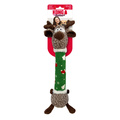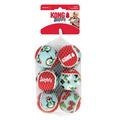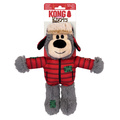Christmas has snuck up on us and is just around the corner! There’s a huge variety of toys and treats out there for your pets to unwrap on the day, but which one should you get for them? How can you work out whether they are safe or appropriate? Here is our pet safe gift guide to help you choose the best possible gift for your furry friend.
1. Check the gift is made for pets
You should only be giving toys/treats that are safe for your pet to use. We strongly recommend you avoid purchasing human toys/treats as these can be toxic or dangerous to our pets. It’s also best to stick to dog toys for dogs, and cat toys for cats as the size can vary greatly. We at VioVet only stock toys/treats from recommended manufacturers whose products are safe for use in animals. You should be able to find all the information about the toy/treat in the product description itself but please contact us on [email protected] if you need any further clarification.
**Top tip** Toys that should NEVER be given to your pet to play with include; string/yarn, small parts, rubber bands, plastic bags. It is ALWAYS safest to stick with purchasing pet-friendly toys.
2. Choosing a toy
The right toy varies greatly depending on the personality, breed and size of your pet. Here are some top tips to help you choose:
-
Toy size - as a general rule you should only use toys that are too big to fit into your pet’s mouth (it should be hanging out the side as they hold it). This prevents any accidental swallowing or choking.
-
Supervise - some animals may need direct supervision when playing, even when using the most hardy of toys. If your pet has been known to rip apart their toys then make sure they are only available to them whilst you can monitor their use. Almost any toy can have small bits ripped off with enough chewing and these bits can be dangerous if swallowed.
-
-
Tugging toys - such as rope toys or rubber rings. These are great for energetic, playful dogs such as Staffies and Rottweilers amongst many others.
-
Chasing/retrieving toys - examples include balls and frisbees. These are perfect for dogs who love to run including sighthounds and working dog breeds.
-
Searching toys - these include toys you can hide treats in (e.g. KONGs) or squeaky toys you can hide around the house. Spaniels and hounds such as beagles love this game.
-
Comforting toys - such as bears or pet-safe stuffed animals. These are best given to more docile dogs as playful breeds will likely tear them apart. Examples include toy or small breed dogs (e.g.chihuahuas) and gentle giants like Mastiffs.
-
Chewing toys - some dogs love to chew, which is also great for their dental health. It is best to choose either edible chew toys or large hardy toys for this. They should be monitored closely when used as rarely they can break apart.
-
-
-
Hunting toys - such as toy mice, teasing wands (fishing pole-like toys) and plastic balls. These are great for cats who are energetic and love to hunt/play.
-
Climbing toys - these include cat climbers/towers. Cats who like to explore will greatly benefit from these.
-
Scratching toys - scratching posts help your cats wear their claws down naturally which is an important part of their normal lifestyle.
-
Hiding toys - examples include cat tunnels or boxes. These are great for cats who are shyer and more reclusive. Those who love to hunt also enjoy playing around the enclosed spaces themselves.
-
3. Choosing a treat
Certain types of human food can be toxic to our pets, it’s really important to feed pet safe treats only. All of the treats we stock on our website are safe for use in pets if you follow the correct feeding guidelines on the packaging. The type of treat you should choose will depend on a few things:
-
Age - stick with kitten/puppy treats in younger animals, as these are easy to chew and can be swallowed safely.
-
Health status - if your pet is being treated for a medical condition then you should run any dietary changes past your vet. One of our vets can provide specific advice if you need it, just contact us on [email protected].
-
Pet weight - treats can be high in calorie so choose ‘low fat’ treats if your pet is prone to weight gain.
-
Allergies and intolerances - if your pet is allergic or intolerant to anything then check the ingredient list thoroughly to avoid setting off a reaction.
-
What your pet likes! - our dogs/cats will have individual tastes, whether that is meat or fish. Try to choose treats with ingredients that your pet has loved before.
Remember, if you need any advice on what gifts to choose for your pet then you can always get in touch. Our customer services and vet team are on hand and very happy to help you this festive season.
Written by: Dr. Nick Garside BVetMed MRCVS








